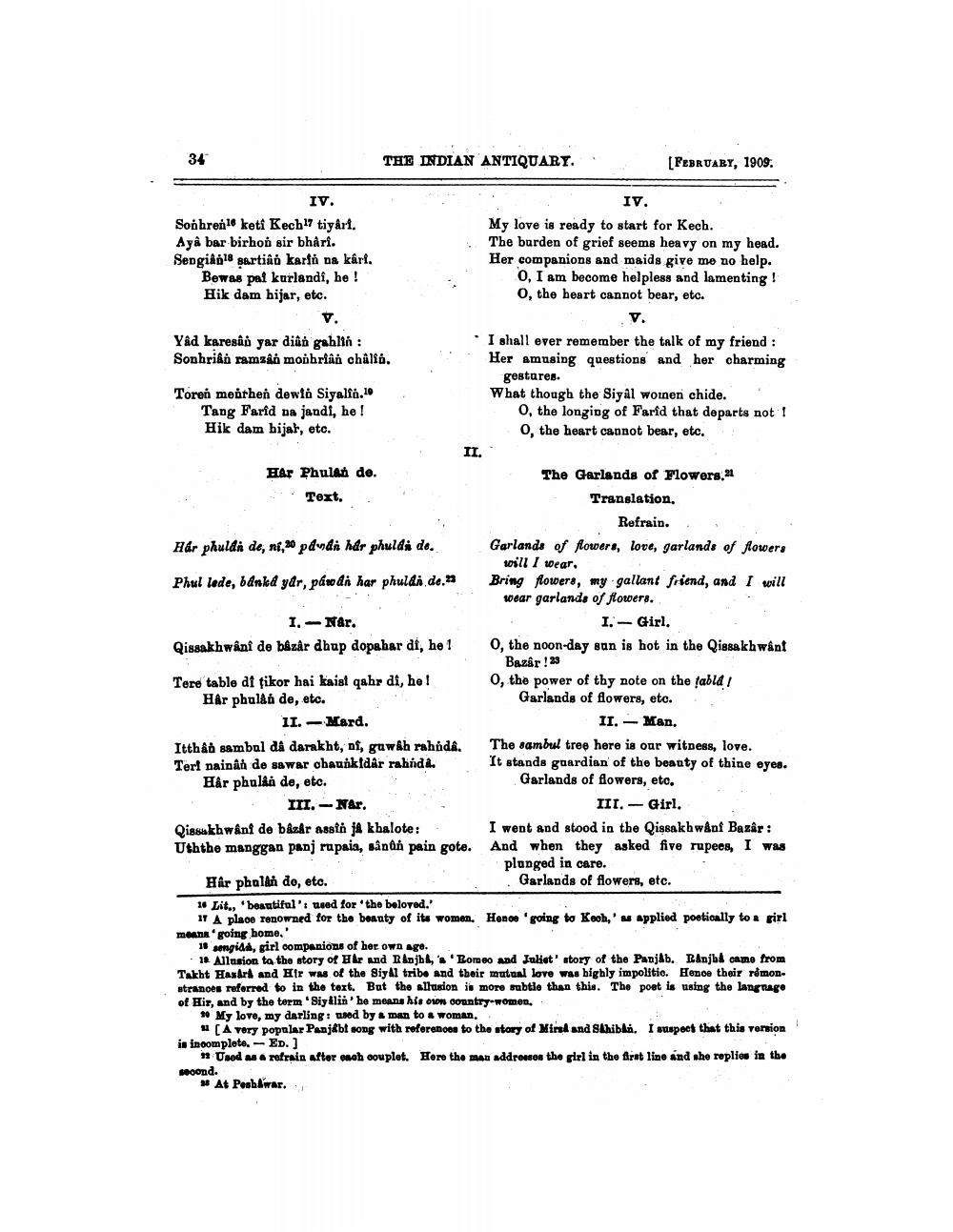________________
34
THE INDIAN ANTIQUARY.
[FEBRUARY, 1909.
IV. Son hreno keti Kech7 tiyâri.
My love is ready to start for Kech. Ayå bar birhon sir bhari.
The burden of grief seems heavy on my head. Sengiảó18 sartiâó karfi na kárt.
Her companions and maids give me no help. Bewas pai kurlandi, he !
O, I am become helpless and lamenting! Hik dam hijar, etc.
O, the heart cannot bear, etc. v. Yad karesad yar diûn guhlin :
• I shall ever remember the talk of my friend : Sonhriên ramzán moibrian chalió.
Her amusing questions and her charming
gestares. Toren menthen dewli Siyallo.10
What though the Siyal wounen chide. Tang Farid da jandi, he !
O, the longing of Farid that departs not ! Hik dam bijat, etc.
O, the heart cannot bear, etc.
II. Har Phulan de.
The Garlands of Flowers, Text. .
Translation,
Refrain. Hár phulda de, ni, no pavda hdr phulds de. Garlands of powers, love, garlands of flowers
will I wear. Phul lede, bankd yar, párodi har phuldi, de. Bring flowers, my gallant friend, and I will
wear garlands of flowers. I. - Når.
I. - Girl. Qissakhwani de bâzâr dhup dopahar df, he 1 O, the noon-day sun is hot in the Qissakhwant
Bazar ! 23 Tere table di ţikor hai kaisl qahr di, he! O, the power of thy note on the tabla 1 Her phulda de, etc.
Garlands of flowers, etc. II. - Mard.
II. - Man. Itthâð sambul da darakht, ni, guwah rahäda. The sambul tree here is our witness, love. Tert nainah de sawar chaunkdar rahnda. It stands guardian of the beauty of thine eyes. Hår phulka de, etc.
Garlands of flowers, eto, III. - Nar.
III. - Girl. Qissakhwant de bazar asta ja khalote:. I went and stood in the Qissakhw&ní Bazar : Uththe manggan panj rupaia, sångn pain gote. And when they asked five rupees, I was
plunged in care. Har phalan do, etc.
Garlands of flowers, etc. 2Lit., 'beautiful': used for the beloved."
11 A place renowned for the beauty of its women. Hence 'going to Keoh,'m applied poetically to a girl means going home.'
18 songida, girl companions of her own age.
1 Allusion to the story of HA and I enj, ''Romeo and Juliet' story of the Panjab. Ranjbl came from Takht Hasara and Hir was of the SiyAl tribe and their mutual love was highly impolitio. Hence their remon. strances reforred to in the text. But the allusion in more subtle than this. The poet is using the language of Hir, and by the term 'Siyklin' he means his own country women,
* My love, my darling: used by & man to a woman.
^ [A very popular Panjabi song with reference to the story of Mink and Sthibka. I suspect that this version is incomplete. - ED.)
1 Unod ma refrain after onch couplet. Here the man addresses the girl in the first line and she replies in the second.
# At Peshawar.




